“Us” (2019). Cast: Lupita Nyong’o, Winston Duke, Shahadi Wright Joseph, Evan Alex, Elisabeth Moss, Tim Heidecker, Cali Sheldon, Noelle Sheldon, Yahya Abdul-Mateen II, Anna Diop, Madison Curry, Ashley Mckoy, Napiera Groves, Alan Frazier. Director: Jordan Peele. Screenplay: Jordan Peele. Web site. Trailer.
Have you ever thought what it might be like to meet yourself? How we see ourselves can be an eye-opening experience, especially if what we observe doesn’t match our expectations. What we encounter could be significantly different from how we believe about our being, our attitudes and our behavior. But, on closer inspection, we may be surprised to see that it’s exactly who we are at our core, a scenario that gives us much to assess, some of which could be at odds with who we’d like to think we are. Such is the case for a seemingly average American family in the revelatory new smart horror release, “Us.”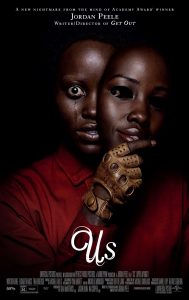
It’s summertime, and the Wilson family is ready for their annual trip to their vacation home near Santa Cruz, California. Parents Adelaide (Lupita Nyong’o) and Gabe (Winston Duke), along with their children, Zora (Shahadi Wright Joseph) and Jason (Evan Alex), look forward to their getaway, but there’s an undercurrent of uneasiness underlying the trip, especially for Adelaide. Gabe does his best to allay his wife’s anxiety, but she quietly continues to harbor her apprehension.
Adelaide is particularly concerned about the family’s planned daytrip to the beach. It’s a popular tourist destination with an adjacent boardwalk and amusement park. With so much to do, it’s the kind of place that should make for a good time, but Adelaide is full of trepidation about the outing because of an experience that happened to her there when she was a child. It was a traumatic incident that she’s kept mum about all these years, but, when Gabe presses her about her hesitation, she finally opens up.
On a warm summer night in 1986, a young Adelaide (Madison Curry) visited the amusement park with her parents, Russel (Yahya Abdul-Mateen II) and Rayne (Anna Diop). At one point while her parents weren’t looking, the youngster inexplicably wandered off, walking into a funhouse with a Native American vision quest theme, one that challenges visitors to “discover yourself.” As she made her way through the structure’s dark and mysterious corridors, she came upon the kinds of elements typically found in these attractions, such as animated figures that pop out of the walls. Needless to say, these features startled the young visitor, but Adelaide’s biggest frights were yet to come.
[caption id="attachment_10623" align="aligncenter" width="300"]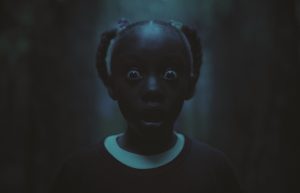 When faced with an unexpected terrifying situation in an amusement park funhouse, young Adelaide Wilson (Madison Curry) reacts in fright to what she sees in director Jordan Peele’s “Us.” Photo courtesy of Universal Pictures.[/caption]
When faced with an unexpected terrifying situation in an amusement park funhouse, young Adelaide Wilson (Madison Curry) reacts in fright to what she sees in director Jordan Peele’s “Us.” Photo courtesy of Universal Pictures.[/caption]
While walking through the funhouse’s hall of mirrors, Adelaide saw something in the looking glass that took her by surprise – an image of what appeared to be herself with her back turned toward her. But then, quite unexpectedly, the figure turned to face her with bulging eyes and a sinister grin beaming from ear to ear.
Adelaide was so stunned by what she saw that she withdrew and stopped talking. Her parents took her to a therapist (Napiera Groves), hoping that counseling would draw out what happened and set her on a course of recovery. And, thanks to her development of an interest in dancing, an adolescent Adelaide (Ashley Mckoy) emerged from her isolation. But, even with the passage of time, the experience still haunts the now-adult Adelaide all these years later.
Gabe is stunned that Adelaide has kept everything locked up inside for so long, but, having now shared the experience, she seems moderately relieved. Consequently, to keep peace in the family, she agrees to go on the outing despite being on guard the whole time. She’s constantly on the lookout for anything unusual, and she has trouble relaxing, even while spending time in the company of her good friends Kitty (Elisabeth Moss) and Josh (Tim Heidecker) and their two daughters (Cali Sheldon, Noelle Sheldon). But, when the time comes to leave, she’s only too happy to pack up and go home.
[caption id="attachment_10624" align="aligncenter" width="300"]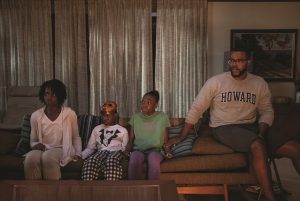 What should be an enjoyable summertime vacation turns contentious when the Wilson family (from left, Lupita Nyong’o, Evan Alex, Shahadi Wright Joseph, Winston Duke) receives a visit from unexpected “guests” in director Jordan Peele’s latest offering, “Us.” Photo by Claudette Barius, courtesy of Universal Pictures.[/caption]
What should be an enjoyable summertime vacation turns contentious when the Wilson family (from left, Lupita Nyong’o, Evan Alex, Shahadi Wright Joseph, Winston Duke) receives a visit from unexpected “guests” in director Jordan Peele’s latest offering, “Us.” Photo by Claudette Barius, courtesy of Universal Pictures.[/caption]
Once back at the vacation house, though, things take a rather weird turn. First the power goes out. And then, lurking in the dark, Adelaide notices a family of four standing in the driveway, one whose members bear an uncanny resemblance to the Wilsons. They stand silently arm in arm dressed in red jumpsuits, each holding what appears to be some kind of pointed golden implement.
Gabe doesn’t think much of it and makes a friendly attempt to see what they want. But, when he finds out these apparent doppelgangers are anything but cordial, the situation turns contentious. The “copies” of Adelaide, Gabe, Zora and Jason, who respectively call themselves Red, Abraham, Umbrae and Pluto, break into the house and begin terrorizing the inhabitants, all for no apparent reason and without making any specific demands – that is, until Red begins to speak, informing her hostages who they are and what they want.
[caption id="attachment_10625" align="aligncenter" width="300"]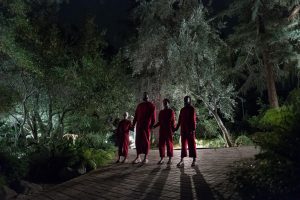 The unexpected appearance of a creepy-looking family (from left, Evan Alex, Winston Duke, Lupita Nyong’o, Shahadi Wright Joseph) places a damper on a summer vacation in the superb new smart horror release, “Us.” Photo by Claudette Barius, courtesy of Universal Pictures.[/caption]
The unexpected appearance of a creepy-looking family (from left, Evan Alex, Winston Duke, Lupita Nyong’o, Shahadi Wright Joseph) places a damper on a summer vacation in the superb new smart horror release, “Us.” Photo by Claudette Barius, courtesy of Universal Pictures.[/caption]
To say more would reveal too much, but suffice it to say that the Wilsons are not the only ones being confronted by their doubles. Everyone, it seems, is being met by their alternate selves. These duplicate beings bring a reign of terror to the world, emerging en masse from what appear to be subterranean tunnels whose existence was virtually unknown by the public at large. Most violently attack their surface world counterparts, while those who don’t join in the barbarism hold hands to form a human chain across the landscape (a gesture eerily reminiscent of the Hands Across America initiative organized to raise awareness about the homeless in the summer of 1986, the time when Adelaide had her traumatic amusement park experience).
But to what end is all of this transpiring? That’s what the Wilsons – and the rest of the world – are about to find out. And the answer will prove quite surprising, to both those on and off the screen.
[caption id="attachment_10626" align="aligncenter" width="300"]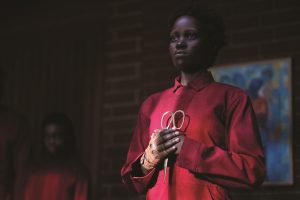 “Red” (Lupita Nyong’o), the enigmatic doppelganger of a middle-aged housewife, makes life hell for her counterpart and her family in director Jordan Peele’s “Us.” Photo by Claudette Barius, courtesy of Universal Pictures.[/caption]
“Red” (Lupita Nyong’o), the enigmatic doppelganger of a middle-aged housewife, makes life hell for her counterpart and her family in director Jordan Peele’s “Us.” Photo by Claudette Barius, courtesy of Universal Pictures.[/caption]
“Us” is a film that raises almost as many questions as it answers. Director Jordan Peele has presented viewers with an intriguing cinematic puzzle, one that’s densely packed with ideas, themes and images and, consequently, is open to interpretation on multiple levels, all equally valid and none contradictory of one another. The key question in this is “What do you believe?”
There’s quite an irony in that, given that the same inquiry is central to understanding the conscious creation process, the philosophy that maintains we manifest the reality we experience through the power of our thoughts, beliefs and intents. In this case, though, the filmmaker is asking us to do as much work in that vein as he’s putting his characters through. In that sense, then, in this case we’re not just being offered a celluloid example of the philosophy at work; we’re also being tasked with engaging in an exercise that allows us to see firsthand how it functions, with each of us given an opportunity to create a cinematic experience of our own, one based on the beliefs we hold about the material being presented to us. And, since conscious creation essentially maintains that we each create our own reality, we’re each going to do just that where this picture is concerned in terms of what we see, what we think about it and what we ultimately experience, all driven by our beliefs.
For the record, we actually do that when we see any movie (or actively engage in participating in any aspect of our existence, for that matter), but we usually take the circumstances and outcomes in those situations for granted, paying little attention to how they arise. Here, though, director Peele places that notion inescapably in front of us, impelling us to participate – consciously – in this exercise in reality creation. In that regard, we’re truly doing more than just watching a movie; we’re being given a metaphysical tutorial of sorts, one that, in the end, is enlightening, entertaining, thought-provoking and a hell of a lot of fun.
[caption id="attachment_10627" align="aligncenter" width="300"]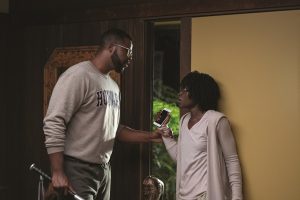 The unexpected arrival of mysterious visitors causes stress for middle-aged housewife Adelaide Wilson (Lupita Nyong’o, right) and her husband, Gabe (Winston Duke, left), in “Us.” Photo by Claudette Barius, courtesy of Universal Pictures.[/caption]
The unexpected arrival of mysterious visitors causes stress for middle-aged housewife Adelaide Wilson (Lupita Nyong’o, right) and her husband, Gabe (Winston Duke, left), in “Us.” Photo by Claudette Barius, courtesy of Universal Pictures.[/caption]
While many viewers are likely to have similar takes on what they see, there will no doubt be instances where individual audience members come up with interpretations all their own. But that’s okay, considering the fodder that the filmmaker gives us to work with (not to mention the fact that we already do the same when it comes to our experiences in other life contexts). So what I offer here are my thoughts on what this picture is saying from a conscious creation perspective. And, in doing so, as I noted above, I’ll make an especially concerted effort to share my views without revealing any spoilers in the process.
The idea of a doppelganger is an intriguing one, a notion that has found its way into an array of subjects, ranging from mysticism and mythology to contemporary psychology. Given this level of pervasiveness, it would seem there must be something to it. But how many of us pay any real attention to it? We tend to ignore the concept until we find ourselves staring it in the face. Then what?
As a general rule, when we come face to face with a manifestation of our personal selves, our first question is usually to ask why it has materialized. What does it want? Is it trying to tell us something? And why now? Those are the questions on the minds of Adelaide and her family when their doubles first appear, and they find the experience frustrating due to the lack of ready answers. I think it’s a safe bet many of us would have comparable reactions. But, where the Wilsons are concerned, this becomes a bigger problem when their unexpected visitors start lashing out at them in violent and hostile ways.
[caption id="attachment_10628" align="aligncenter" width="300"]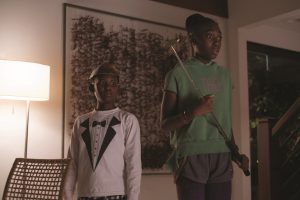 Siblings Jason (Evan Alex, left) and Zora (Shahadi Wright Joseph, right) are forced to grow up a lot faster than they had probably imagined when faced with tremendous horrors in the gripping new offering, “Us.” Photo by Claudette Barius, courtesy of Universal Pictures.[/caption]
Siblings Jason (Evan Alex, left) and Zora (Shahadi Wright Joseph, right) are forced to grow up a lot faster than they had probably imagined when faced with tremendous horrors in the gripping new offering, “Us.” Photo by Claudette Barius, courtesy of Universal Pictures.[/caption]
Considering where the doubles are said to have originated, though, the answers might come a little more easily. Having emerged from a complex of underground tunnels into the light of the world aboveground, the doppelgangers are in many ways symbolic of our shadow selves, that little-seen part of our being that resides within the darkness inside us. It’s a portion of our being that’s largely ignored, if not summarily disparaged, looked upon as inherently inferior, perhaps even evil. It’s something most of us would much more readily disavow than acknowledge.
However, as much as we might try to deny this portion of our self, it’s nevertheless part of who we are. And, because of this, imagine how we would feel if we were to walk in its shoes. The lack of recognition and blanket rejection must be utterly unbearable. Given that, then, is it any wonder that the shadow self might eventually rise up and rebel, demanding to share in the same blessings we have come to enjoy from living life in the light? Of course, having spent its entire existence in the murky depths, is it also any wonder that our shadow might not know how to properly (i.e., civilly) seek equitable treatment? That would explain the barbarous behavior, now wouldn’t it?
If it’s possible to envision how this would work for an individual, imagine the same for a collective of similarly situated beings. This would account for the film’s mass uprising. But, speaking symbolically once again, this is an allegory for the outcasts of contemporary society – women, minorities, immigrants, the economically disadvantaged – everyone who has been denied the opportunity the revel in the bounty that comes from the abundance afforded by “life on the surface,” those who reside above those literally and figuratively relegated to the underworld.
[caption id="attachment_10629" align="aligncenter" width="300"] Middle-aged housewife Adelaide Wilson (Lupita Nyong’o) fights back when confronted with extraordinary circumstances in the new smart horror release, “Us.” Photo by Claudette Barius, courtesy of Universal Pictures.[/caption]
Middle-aged housewife Adelaide Wilson (Lupita Nyong’o) fights back when confronted with extraordinary circumstances in the new smart horror release, “Us.” Photo by Claudette Barius, courtesy of Universal Pictures.[/caption]
What’s even more telling in this scenario is the shoddy treatment the surface dwellers afford their below-ground counterparts. Those who live in the world below are dismissed, treated as if they didn’t exist, a circumstance that can be applied both to our individual selves as well as society as a whole. And, sadly, this is “us,” a realization that makes the picture’s title fittingly chilling in light of its narrative and genre.
Considering that indifferent, condescending attitude – one created by the beliefs of those who hold it – it’s not too difficult to figure out what it would take to get their attention. And those who demand their share of the pie may not be as gracious in seeking it as those living in the light might think they should be (the one-percenters may want to take note of this). But, then, such outcomes are not unexpected when we practice un-conscious creation, an expression of the philosophy that results when we focus exclusively on manifesting what we want with no consideration for the consequences of our efforts, one often fraught with unintended and undesirable side effects. In this case, the resulting situation calls to mind a Biblical passage that’s prominently featured in the film literally, figuratively and symbolically, the text of Jeremiah 11:11: “Therefore thus saith the Lord: ‘Behold, I will bring evil upon them, which they shall not be able to escape; and though they shall cry unto Me, I will not hearken unto them.” Yet another belief is fulfilled, one as reflective of the notions held by its adherents as anything seen in the funhouse hall of mirrors.
Admittedly, the foregoing is a lot to absorb, but, in actuality, it’s only part of the story. There’s potentially much more one can take away from this film, again, depending on the individual belief-based interpretations discussed earlier. I could say more, but I’d be straying too close to the spoiler territory I endeavor to avoid. So my recommendation is to watch this one for yourself and see what you get out of it. Personally, I can’t wait to see it again to see what I may have missed the first time.
[caption id="attachment_10630" align="aligncenter" width="300"] When middle-aged housewife Adelaide Wilson (Lupita Nyong’o, right) confronts her dubious double, Red (Lupita Nyong’o, left), the encounter quickly turns into a fight for survival in the gripping new smart horror offering, “Us.” Photo by Industrial Light & Magic, courtesy of Universal Pictures.[/caption]
When middle-aged housewife Adelaide Wilson (Lupita Nyong’o, right) confronts her dubious double, Red (Lupita Nyong’o, left), the encounter quickly turns into a fight for survival in the gripping new smart horror offering, “Us.” Photo by Industrial Light & Magic, courtesy of Universal Pictures.[/caption]
This richly layered, deftly nuanced smart horror offering tells a tale that gives the audience much to think about upon leaving the theater. Director Peele’s second feature defies “the sophomore jinx” that often plagues filmmakers who fail in their followup efforts after impressive debuts. The picture delivers an expertly crafted allegorical story that’s captivating and insightful, accompanied by great laughs and a few good scares without becoming gratuitous. This is all made possible by the superb performances of its excellent ensemble cast, most notably Nyong’o, who turns in some of her best on-screen work in this offering. And, as you watch it, take nothing for granted; everything has a purpose in the narrative, no matter how seemingly insignificant. As good as his first picture, “Get Out” (2017), was, the filmmaker has taken a quantum leap in his artistry and storytelling skills with this release, an accomplishment that puts him in a class by himself and will likely allow him to write his own ticket from here on out.
When we come face to face with ourselves, we’re forced into confronting what we see. No matter how much we might try to deny or disavow what we witness, though, we can’t realistically do so if we truly want to understand who we are at the center of our being. And, if we dislike what’s there, then we must take an earnest look at how it arose, analyzing and, if needed, changing the thoughts, beliefs and intents that gave life to it. After all, when we come right down to it, that’s us – whether we like it or not.
Copyright © 2019, by Brent Marchant. All rights reserved.
Thursday, March 28, 2019
‘Us’ forces us to take a look at ourselves
Catch Movies with Meaning
Join host Frankie Picasso and me this Thursday, March 28, for the latest edition of Movies with Meaning on The Good Media Network’s Frankiesense & More broadcast. We’ll look at a variety of new releases and share the latest movie news. For the video version, tune in on Facebook Live at 1 pm Eastern by clicking here. And, for the audio-only podcast edition, check out The Good Media Network’s home page by clicking here. Join us for some lively movie chat!

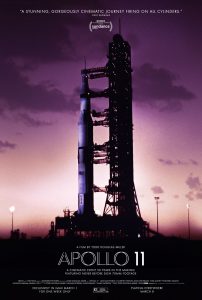
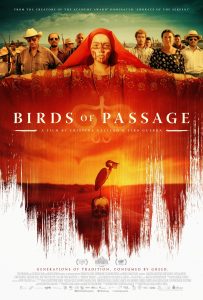


Monday, March 25, 2019
‘Smuggling Hendrix’ unleashes the call for freedom, harmony
“Smuggling Hendrix” (2018). Cast: Adam Bousdoukos, Fatih Al, Vicky Papadopoulou, Özgur Karadeniz, Georgia Constantinou, Toni Dimitriou, Marios Stylianou, Andreas Phylactou, Charlambos Charlambou, Pepper. Director: Marios Piperides. Screenplay: Marios Piperides. Web site. Trailer.
What can we learn from our pets? Actually, quite a lot, as long as we’re paying attention. The trick, of course, is looking behind what they’re trying to show us, to see the real meaning behind their actions. But, if we do so, we might reap some tremendous benefits. So it is with a four-legged furry mentor in the charming new comedy, “Smuggling Hendrix.”
On the divided Mediterranean island of Cyprus, where combative Greek and Turkish factions have been living under a somewhat uneasy truce for more than four decades, life can be complicated, even when attempting to accomplish the simplest of tasks. That’s what a shaggy, unemployed musician, Yiannis (Adam Bousdoukos), discovers when his dog, Jimi (Pepper), goes astray. The scruffy pooch, named for legendary guitarist Jimi Hendrix, may be lovable, but he can also be quite mischievous. And, unfortunately, because of the island’s bureaucracy, regulations and long-simmering mistrust among residents, something as seemingly simple as retrieving a lost pet becomes an unbelievably complex, incredibly maddening experience.
This situation is especially frustrating for Yiannis, given that he’s three days away from leaving the island to start a new life in Holland. He’s tired of things never working out, not to mention the daily hassles of living in Nicosia, the country’s divided capital city. So it goes without saying that he doesn’t need these kinds of annoyances as he attempts to wrap up his affairs before departing.
So how does this situation come to pass? While running last-minute errands and walking Jimi, Yiannis unexpectedly encounters a number of people he’s trying to avoid – Kika (Vicky Papadopoulou), his ex-girlfriend with whom he had a difficult breakup; Pambos (Toni Dimitriou), a loan shark from whom he borrowed funds to make an unsuccessful album and who now wants to collect on his debt, backed by the support of his hired muscle, Antonis (Marios Stylianou); and his feisty landlady (Georgia Constantinou), to whom he owes five months’ back rent. He does his best to evade them, hiding out in an antique shop. But, while waiting things out, Jimi breaks free and escapes. The dog starts running the streets, fleeing from Nicosia’s Green-controlled sector to the cordoned off Turkish territory.
[caption id="attachment_10614" align="aligncenter" width="300"] Shaggy, unemployed musician Yiannis (Adam Bousdoukos, left) discovers the pettiness of bureaucratic regulations when he tries to bring his retrieved dog, Jimi (Pepper), across the border from Turkish-controlled territories to Greek-controlled lands on the divided island of Cyprus in the endearing new comedy, “Smuggling Hendrix.” Photo courtesy of The Match Factory.[/caption]
Shaggy, unemployed musician Yiannis (Adam Bousdoukos, left) discovers the pettiness of bureaucratic regulations when he tries to bring his retrieved dog, Jimi (Pepper), across the border from Turkish-controlled territories to Greek-controlled lands on the divided island of Cyprus in the endearing new comedy, “Smuggling Hendrix.” Photo courtesy of The Match Factory.[/caption]
On the surface, Jimi’s little escapade may not seem like a big deal, but getting him back is, because traveling from one sector of the city to another isn’t especially easy. To move between territories, visitors must pass through two checkpoints, one staffed by national authorities and one manned by United Nations peacekeepers. Even though this process generally only requires showing one’s papers, there are other kinds of restrictions involved. Since the Greek-controlled territory of Cyprus belongs to the European Union, anyone returning to lands under EU auspices must abide by the Union’s restrictions. And, since the Turkish-controlled area of Nicosia is part of a self-proclaimed independent state that virtually no one officially recognizes (including EU member states), anyone returning to Union-governed territories must abide by the organization’s various entry protocols, some of which can be rather stringent, as Yiannis soon finds out for himself.
To retrieve Jimi, Yiannis crosses from the island’s Greek sector to the breakaway Turkish Republic of Northern Cyprus. And, miraculously, he finds his beloved canine surprisingly quickly. However, in attempting to return to his homeland, he’s told by authorities that he can’t bring the dog back over the border. Doing so would violate EU quarantine restrictions against the importation of potential biological health hazards from an unrecognized nation. Yiannis pleads his case, noting his impending departure from the island, but to no avail. So now what?
Unwilling to abandon Jimi, Yiannis sets about devising a plan to smuggle his dog back into the Greek-controlled territory, but that proves easier said than done. Thanks to a series of additional incidents, Yiannis’s plans routinely go awry. Along the way, circumstances bring him into contact with Hasan (Fatih Al), a Turkish mechanic who reluctantly agrees to help arrange an expensive, clandestine cross-border passage for Jimi with the aid of a shady drug dealer, Tuberk (Özgur Karadeniz). When that doesn’t work out, Yiannis then seeks to make alternate arrangements that unwittingly draw him into the company of those he’s trying to avoid – Kika, Pambos, Antonis and his landlady, all of whom make his life even more difficult. And, of course, there’s Jimi, whose antics continue to frustrate his owner. Meanwhile, the clock is counting down to Yiannis’s scheduled departure. Will everything work out in time?
To call this situation a comedy of errors would be an understatement. But, at the same time, it also draws attention to a number of more serious matters worthy of profound consideration, particularly the underlying beliefs that brought them into being. As products of the conscious creation process, the philosophy that maintains we manifest the reality we experience through the power of our thoughts, beliefs and intents, these issues ultimately arise from us, making us the ones responsible for their materialization and inherent qualities, including any alterations that are deemed necessary to make them more to our liking.
Most notably this is true where the island’s political situation is concerned. Cyprus is a divided nation, one saddled with self-imposed borders that keep its inhabitants apart from one another, each faction believing it has a right to its lands, rights of self-governance and so forth. Such a separation didn’t arise by osmosis, though; it was created, brought into being by beliefs of those on each side of the barricades. Ironically, though, the Greek and Turkish residents depicted in the film each routinely insist upon the intrinsic brotherhood that binds them, that, in the end, they’re all members of the same human race.
But, if that’s true, then why the borders? Why are the island’s artificial boundaries set up to keep these supposed brothers apart? Lurking behind the superficial proclamations of unity lies an innate mistrust that has spawned and continues to enforce this division.
At the same time, though, everyone in the story seems to love Jimi. They all seem to be able to agree that affection for a pet transcends the social and political boundaries that separate individuals from one another. So, if everyone can agree on that where an animal is concerned, then why can’t they do the same when it comes to their outlooks toward their fellow man? Jimi helps to unite the humans where he’s concerned, setting an example for them to do the same with one another – provided they avail themselves of it.
But, if that’s going to happen, then a belief change is obviously in order, something that may not be as easy to achieve as one might hope. If the parties can’t agree on something as simple as the requirements for bringing a pet across the border, then what hope is there for the feuding factions to come together in peace and harmony? It’s by no means impossible, but the change must begin with the beliefs each side holds. One can only hope Jimi provides them with some inspiration to do so.
For a suitable reconciliation to occur, for each faction to truly come together as the brothers they claim to be, they must join forces in an act of co-creation, one driven by commonly held cooperative beliefs. It’s a point the film drives home repeatedly where the Cypriot political situation is concerned, with Jimi serving as the catalyst for attempting to draw his divided human countrymen together. The misadventures they jointly share reveal the petty ridiculousness driving the circumstances that keep them apart, conditions that both separate man from dog and fellow man from fellow man. Indeed, if we’re all one big human family, this niggling estrangement seems pretty silly in the end – and, ironically, it takes man’s best friend to help show us the errors of our ways and the beliefs behind them.
In addition to the harmony Jimi’s actions promote, he also exemplifies the spirit of individual freedom. His escape embodies the exhilaration of being unleashed, allowed to run free, both literally and figuratively, to pursue what he wants. This is something most of us long to do but often feel we are unable to experience due to the many ties that bind us. Yiannis clearly wishes for this, for example, as evidenced by his desire to be free of the aggravations of life on Cyprus, not to mention his longing to break the chains that tie him to his past. If that’s to happen, though, he must believe in the possibility, an option that just might happen if he follows Jimi’s lead. Good luck to him and all those who desire to cut loose and run like the wind.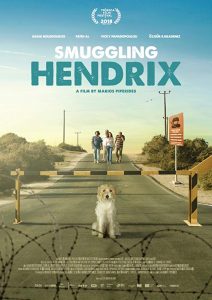
This delightful tale about a scruffy pooch showing us the needless difficulty involved in bringing us together as a unified people is funny, touching and heartwarming. Though a little too political at times, the film nevertheless does an excellent job of explaining a contentious situation that hasn’t received much attention in quite some time, while simultaneously casting a bright light on the need to resolve a dispute that has gone on far too long. Most of all, though, the charm and whimsy that provide the basis of this story make for enjoyable and endearing viewing, showing the lengths some of us, thankfully, are willing to go to for something as elemental as protecting the welfare of our four-legged friends. If only we could do the same for those who walk upright.
“Smuggling Hendrix” has primarily been playing the film festival circuit. Check the picture’s web site for further details.
When our furry friends behave in line with our wishes, we reward them with treats. But who rewards us? Well, we can’t expect our four-legged pals to return the favor, but, if we follow their leads and the examples they set for us, maybe we can reward ourselves with morsels yummier than the best dog biscuits imaginable. And, when we see just how tasty those treats can be, that will really give us something to bark about.
Copyright © 2019, by Brent Marchant. All rights reserved.
Sunday, March 24, 2019
This Week in Movies with Meaning



Wednesday, March 20, 2019
‘Styx’ tackles morality on the high seas
“Styx” (2018 production, 2019 release). Cast: Susanne Wolff, Gedion Odour Wekesa, Felicity Babao (voice), Alexander Beyer (voice). Director: Wolfgang Fischer. Screenplay: Wolfgang Fischer and Ika Künzel. Web site. Trailer.
When confronted with difficult situations, most of us probably do our level best to do the right thing. Were we to do otherwise, we’d likely have trouble living with ourselves, so earnestly taking steps to accommodate the circumstances often comes naturally, almost like a knee-jerk reaction. But what do we do when we’re faced with something particularly troubling, a scenario in which we’re up against seemingly impossible odds? Such circumstances push us to take a hard look at ourselves to see just how far we’ll go, a conundrum faced by a woman with her back against the wall in the new high seas drama, “Styx.”
To get away from the high-stress conditions of her everyday life, Rieke (Susanne Wolff), a determined, self-assured emergency room physician, embarks on a long-cherished dream of sailing solo from Gibraltar to Ascension Island in the south central Atlantic. The independently minded thirty-something German doctor has spent a great deal of time preparing for the trip, equipping her yacht with ample supplies and charting her course in exacting detail. It would seem she’s ready for just about any contingency, a wise decision given what she’s planning to undertake.
Despite the potential challenges that await her, Rieke looks forward to her journey. She’s eager to see the remote, little-visited island, particularly its distinctive vegetation, most of which was imported after one of its first visitors, Charles Darwin, reported that it had little of its own native plant life. In many ways, Ascension subsequently evolved as a sort of botanical laboratory, making it one of the most unusual and unique environments on the planet. It promises to be quite the adventure. But, not long after Rieke sets sail, the adventure proves to be more than what she bargained for.
[caption id="attachment_10602" align="aligncenter" width="300"] German emergency room physician Rieke (Susanne Wolff) sets off on the adventure of a lifetime when sailing solo from Gibraltar to Ascension Island in the gripping new oceanic saga, “Styx.” Photo courtesy of Beta Cinema.[/caption]
German emergency room physician Rieke (Susanne Wolff) sets off on the adventure of a lifetime when sailing solo from Gibraltar to Ascension Island in the gripping new oceanic saga, “Styx.” Photo courtesy of Beta Cinema.[/caption]
As Rieke sets out on her voyage, she basks in the beautiful weather and looks forward to smooth sailing. However, upon making radio contact with the communications officer of a nearby freighter (Alexander Beyer), she learns that a storm lies ahead, necessitating her to batten down the proverbial hatches. And, when the bad weather hits, it proves to be quite a challenge to stay afloat, not only because of its intensity, but also because it strikes at night. But, nature’s fury aside, Rieke manages to keep her craft upright and survives to sail on.
Not long after the storm passes, however, Rieke encounters another challenge: she spots a decrepit African refugee ship that’s taking on water and slowly sinking, with an estimated 100 passengers aboard. She reports the overloaded vessel to the Coast Guard, asking the officer (Felicity Babao) what she should do. The officer thanks Rieke for reporting the incident but sternly orders her to take no further action, warning her that getting involved could conceivably make the situation worse. She also tells Rieke not to worry, assuring her that Coast Guard assistance is on the way.
The officer’s response doesn’t sit well with Rieke. As she watches the sinking sink from afar, she witnesses its passengers growing ever more desperate, some of them even leaping into the water in futile hopes of escaping the doomed vessel. Her instinctive desire to help kicks in, but, again, she’s advised to steer clear, despite the increasingly dire drama unfolding before her. And the more time passes with no sign of a Coast Guard rescue party, Rieke grows progressively frustrated. She maintains a discrete distance but feels compelled to take action. After all, as a doctor, she believes she’s got to do something for those who are clearly suffering.
[caption id="attachment_10603" align="aligncenter" width="300"]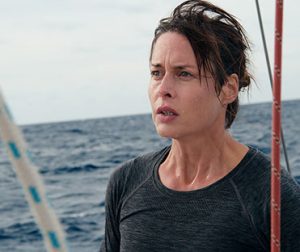 Upon the sighting of a sinking African refugee ship, solo sailor Rieke (Susanne Wolff) struggles with what course of action to take in director Wolfgang Fischer’s award-winning new release, “Styx.” Photo courtesy of Beta Cinema.[/caption]
Upon the sighting of a sinking African refugee ship, solo sailor Rieke (Susanne Wolff) struggles with what course of action to take in director Wolfgang Fischer’s award-winning new release, “Styx.” Photo courtesy of Beta Cinema.[/caption]
Before long, Rieke’s hand is called when one of the refugees jumps ship and begins swimming toward her boat. The sickly, injured teenager (Gedion Odour Wekesa) struggles to reach her vessel, collapsing once he’s on deck. Rieke attends to his medical needs, hoping to stabilize his condition. And, as she awaits her patient to respond to treatment, she agonizes over officialdom’s quite obvious indifference to the plight of those in need of help.
However, even if she wanted to get more directly involved, there’s little that Rieke could realistically do to assist the other refugees. Her sailboat is far too small to accommodate all of the remaining passengers. And, considering this limitation, how could she possibly be the one to decide who gets saved and who doesn’t? Yet standing by and doing nothing is no answer, either. Rieke struggles to devise a solution, a problem that’s made more complicated when her patient regains consciousness and hysterically demands that she do something.
With no sign of the Coast Guard coming to the refugees’ aid, Rieke finally takes matters into her own hands. To say what she does would reveal too much, but suffice it to say that her truly innovative solution carries a tremendous cost for those involved. Nevertheless, impossible situations often call for improbable approaches to arrive at agreeable outcomes.
Such are the circumstances that characterize this morality play on the high seas. It’s a story driven by an array of ideas, reflected through the beliefs held by each of the principal players, both seen and unseen. And how the scenario plays out is directly dependent on those various notions, for they form the basis of the conscious creation process, the philosophy that maintains we manifest the reality we experience through the power of our thoughts, beliefs and intents.
This multifaceted saga most obviously involves the fate of the refugees, but there are other aspects of this tale that are just as important, even if not as plainly apparent. Where the primary story thread is concerned, there are multiple belief outlooks in play – those of the authorities, whose concern is questionable at best, those of Rieke, which are clearly driven by compassion, and those of the refugees, who have ostensibly created through these conditions a test of character for their would-be rescuers. Resolution will depend on which beliefs hold sway, a circumstance that fundamentally means multiple outcomes are ultimately possible, one of the core concepts that defines the functioning of the conscious creation process.
[caption id="attachment_10604" align="aligncenter" width="300"]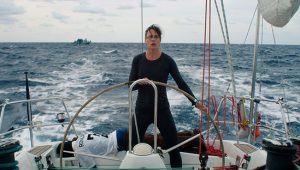 While attending to an injured African refugee (Gedion Odour Wekesa, laying on deck), physician and sailor Rieke (Susanne Wolff, standing) struggles to help those in need while awaiting help from a noticeably absent Coast Guard rescue party in “Styx.” Photo courtesy of Beta Cinema.[/caption]
While attending to an injured African refugee (Gedion Odour Wekesa, laying on deck), physician and sailor Rieke (Susanne Wolff, standing) struggles to help those in need while awaiting help from a noticeably absent Coast Guard rescue party in “Styx.” Photo courtesy of Beta Cinema.[/caption]
Based on the conversations and events here, sadly, the attitudes of officialdom are quite telling, presumably reflective of the beliefs underlying them. The authorities are only too willing to assist an affluent White European woman but unconcerned in coming to the aid of a group of Black African refugees, women and children included. Politically correct rhetoric and pronouncements aside, the actions of officials here thus speak volumes about what their real views are.
But this question is not the only issue put to the test in this situation. Rieke’s personal character is challenged by what’s unfolding around her, forcing her into addressing issues like transformation, innovation, sacrifice and salvation, both for those she’s trying to help as well as for herself. How she views the events at hand will determine her responses, which, in turn, will further alter her beliefs and what subsequently stems from them. It’s a very fluid situation as she assesses the conditions and attempts to come up with solutions for attending to them. It not only calls forth traits she already possesses, but it also pushes the emergence of others, including some of which she may have previously been unaware, enabling her to evolve in ways she may not have envisioned when she embarked on her journey. She may find that surprising. But, then, given her projected destination – Ascension Island, a locale distinguished by its own exploration of the concept of evolution – her character-testing experience with the refugees is an ironically fitting reflection of that idea where she’s concerned personally.
This is particularly noteworthy where the question of responsibility is concerned. Rieke is already well versed in this subject given her profession. However, with what she’s up against on the high seas, this notion gets pushed to a new level. In this case, her actions veer into the territory of taking a stand to make a difference, forging a safety net essentially from scratch, despite the perilous potential consequences, in light of an apathetic bureaucracy that fails to live up to its own responsibility. In doing so, she needs to surpass the limitations at hand, drumming up new solutions to suit the unparalleled circumstances she now faces.
In addition to these considerations, the film is loaded with religious symbolism fitting to the story. First there’s the title, “Styx,” a reference to the river the deceased traversed in journeying to the Underworld in Greek mythology, an appropriate symbol for a life and death situation taking place on water. From the story itself, there’s Rieke’s experience with the storm, an event that serves as her own “dark night of the soul” experience, one in which she’s tested on the resilience of her faith in herself and in the assumed support of the Universe. And then there’s Rieke’s stated destination, “Ascension” Island, a place whose name reflects the transformative nature of her journey, a designation that metaphorically embodies the divine ascendancy attained by Christ after a life of salvation and compassion toward others, acts that Rieke unhesitatingly engages in herself when circumstances warrant. These narrative enhancements aren’t intended to evangelize audiences, but they add nuance to the story, strengthening the film’s prevailing viewpoints, ultimately making for a more powerful and more meaningful picture, one worthy of the introspection it was designed to engender.
Despite some occasional pacing issues, this fact-based, richly symbolic drama sizzles with quiet intensity against the backdrop of beautiful ocean scenery. The picture’s thoughtfully constructed script leaves viewers with much to ponder, some of it inspiring, some of it unsettling, but you’re sure not to come away from this one feeling neutral. Susanne Wolff’s superb portrayal of a woman pitted against the perils of nature and the difficulty of hard choices is riveting from start to finish. Director Wolfgang Fischer’s minimalist approach suits the story perfectly, especially when enlivened by its positively gorgeous cinematography. There’s a good chance that this consuming release will leave you drained, and incensed, but also, one would hope, uplifted.
“Styx” has primarily been screening on the film festival circuit, where it has garnered numerous awards and nominations. A limited theatrical release is currently under way as well; check your local film listings and the film’s web site for details. And, by the way, those who dislike reading subtitles should note that, even though this is a German-Austrian co-production, most of the dialogue is in English.
Our ability to take the interests of others into account is often seen as one of the traits that separates us from the animals. Self-interest is assumed to be substituted by selflessness. But, as this film shows, that may not always be the case; it’s a point on which we might well fail. Thankfully, though, there are those who believe in living up to that loftier aspiration, even when the going gets tough. That’s one of those qualities that defines us as humans – and that puts the “human” in “humanity.” Let’s hope we never lose sight of that.
Copyright © 2018-19, by Brent Marchant. All rights reserved.
Tuesday, March 19, 2019
Tune in for The Cinema Scribe


Monday, March 18, 2019
‘Apollo 11’ stirs the pride of accomplishment
“Apollo 11” (2019). Cast (Archive Footage): Neil Armstrong, Buzz Aldrin, Michael Collins, President Richard Nixon, President Lyndon Johnson, President John F. Kennedy, Walter Cronkite, Gene Kranz, Clifford E. Charlesworth, Charles Duke, Deke Slayton, Bruce McCandless II, Jim Lovell, Janet Armstrong. Director: Todd Douglas Miller. Web site. Trailer.
There was a time when the idea of reaching for the stars was a goal that was being pursued literally. It filled us with a pride, enthusiasm and a spirit of adventure. It’s also something we seem to have lost in the years since then. Thankfully, though, there’s a new documentary that reminds us of that time, reigniting those feelings, at least for the time we’re seated in the movie theater, the stirring account of a truly historic space flight, “Apollo 11.”
In 1961, when President John F. Kennedy proposed the goal of sending a man to the moon and safely returning him to the Earth, the nation zealously rallied behind this ambitious initiative in a way rarely seen in the country’s history. It was looked upon as an enormous challenge, one full of unknowns and risks. But it was embraced with tremendous enthusiasm and an irrepressible “can do” attitude. And, after years of effort, determination and sacrifice, that noble prospect was about to be realized in 1969 with the historic launch of the Apollo 11 mission.
In July of that year, astronauts Neil Armstrong, Buzz Aldrin and Michael Collins embarked on their epic journey, backed by an army of flight engineers and technical and support staff, along with the collective encouragement of the American people and the citizens of the world. The pre-launch fervor was palpable and infectious. The fate of the intrepid trio was on everyone’s mind, with countless spectators assembled at the Kennedy Space Center and in front of their TV sets to witness the much-anticipated start of this incredible expedition, arguably the most significant event in the history of mankind.
[caption id="attachment_10593" align="aligncenter" width="300"] As it lifts off from the Kennedy Space Center, the Saturn V rocket carrying the crew of the first manned mission to the moon soars into the heavens as seen in the excellent new documentary, “Apollo 11.” Photo courtesy of Neon.[/caption]
As it lifts off from the Kennedy Space Center, the Saturn V rocket carrying the crew of the first manned mission to the moon soars into the heavens as seen in the excellent new documentary, “Apollo 11.” Photo courtesy of Neon.[/caption]
Amidst great fanfare and set against the backdrop of a pristine azure sky on July 16, the enormous Saturn V rocket carrying the Apollo 11 crew blasted off into the cosmos. Onlookers stared in awe as the craft soared into the heavens. Thus began the heroic saga that a generation had awaited, its fulfillment nearly at hand.
Over the next four days, Apollo 11 made its way toward a rendezvous with its destiny. On July 20, the Eagle lunar lander separated from the spacecraft’s command module for its descent to the moon, where astronauts Armstrong and Aldrin took humanity’s first steps onto the surface of another world, truly a giant leap for mankind.
This remarkable documentary chronicles the moment-by-moment events that made up this legendary mission. Relying only on footage and audio recordings from the time, the film shows viewers what happened exclusively through the accounts of witnesses to the saga. Some of these materials will no doubt appear familiar, but others present details less known or not seen before. But, as impressive as this film is, what’s equally extraordinary is what’s shown and not told – the boundless captivation associated with this grand undertaking.
“Apollo 11” depicts this venture as the great endeavor it truly was, one whose occurrence resulted from an unparalleled effort by those directly involved in it and those who lent their backing to see it happen. This collectively inspired and manifested event is, arguably, the pinnacle of mankind’s accomplishments. It’s also a shining example of the conscious creation process at work, the philosophy that maintains we materialize the reality we experience through the power of our thoughts, beliefs and intents. And, given the joint nature of this undertaking, it shows the enormous power of co-creation, one that shows what we as a species are capable of when we pool our resources, both materially and metaphysically.
[caption id="attachment_10594" align="aligncenter" width="300"]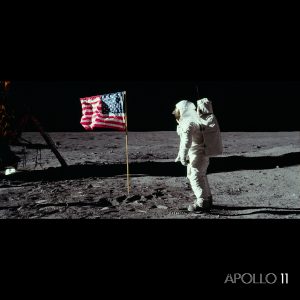 Standing on the surface of the moon, astronaut Neil Armstrong takes in the magnitude of this giant leap for mankind in the riveting new documentary, “Apollo 11.” Photo courtesy of Neon.[/caption]
Standing on the surface of the moon, astronaut Neil Armstrong takes in the magnitude of this giant leap for mankind in the riveting new documentary, “Apollo 11.” Photo courtesy of Neon.[/caption]
Given the magnitude of this mission and the larger program of which it was a part, it’s indeed remarkable to see what was accomplished, especially in light of the limited and far less sophisticated technology of the time. However, what’s even more astonishing is that this tremendous attainment originated with an idea, an intangible notion far removed from the physical fulfillment of this sought-after goal. In fact, that this accomplishment was eventually realized at all is truly mind-blowing, but, then, that also demonstrates the tremendous power inherent in our beliefs. If we can harness them to achieve something as astounding as this, imagine what else we might use them for. Such a realization, if employed routinely and jointly, could be used to solve the world’s problems and create grand new conceptions, leading us to other accomplishments as enviable as any footstep taken on the lunar surface.
The effort was not without its potential pitfalls, though. One of the chief hurdles for program participants was to overcome any fears they might have. With many having been test pilots, they were generally accustomed to taking envelope-pushing risks. However, given that this program’s undertakings involved largely untried technology, there were ample uncertainties going in, as evidenced by the various failures and tragedies that occurred along the way. To maintain forward momentum, those incidents had to be seen for what they were – learning experiences from which mistakes were to be ascertained and eliminated for the future. But confirmed beliefs in personal courage were essential in paving the way for such an outlook, an essential ingredient in the run-up to the Apollo 11 mission.
[caption id="attachment_10595" align="aligncenter" width="300"]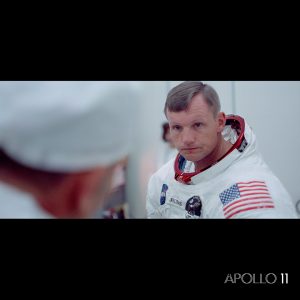 Astronaut Neil Armstrong prepares for his epic journey to the moon in the superb new documentary of this historic event, “Apollo 11.” Photo courtesy of Neon.[/caption]
Astronaut Neil Armstrong prepares for his epic journey to the moon in the superb new documentary of this historic event, “Apollo 11.” Photo courtesy of Neon.[/caption]
Of course, overcoming fears means overcoming a limitation, something that everyone associated with the space program and the Apollo 11 mission needed to do on a regular basis on a number of fronts. Getting to the moon wasn’t going to happen by playing it safe or thinking conventionally; it took fresh ideas and the implementation of never-before-tried conceptions, both of which called for pushing the boundaries of imagination and belief formation to come up with the means to make this cherished dream possible.
As noted before, though, the most significant element that made this venture work was everyone pulling together as a team. Having a collective goal can work wonders in uniting people, bringing them together for a jointly shared vision. Landing a man on the moon was perhaps one of the greatest examples of such a grand pooling of efforts. For those of us old enough to remember that time, it was something in which we all took pride, the kind of mutual undertaking we haven’t seen since – and that we could use today. Initiatives like building a border wall just aren’t in the same league as something as audacious as planting ourselves on another world.
This expertly crafted account of this epic mission is quite a film. It effectively captures the look and feel not only of the event, but also of the times in which it took place, effectively evoking feelings that are both nostalgic and prideful. It reminds viewers of a time when the country truly was great and its people had something to believe in, words to the wise for those of us living in a time that’s a mere shadow of what it once was.
Inspiration can be a tremendous motivator. Let’s hope that the encouraging example set in “Apollo 11” helps to restore those feelings, emboldening us to think, live and believe audaciously once again. And, this time, maybe we’ll reach those stars after all.
Copyright © 2019, by Brent Marchant. All rights reserved.
Friday, March 15, 2019
This Week in Movies with Meaning
Reviews of "Captain Marvel," "Birds of Passage" ("Pájaros de verano") and "The Extraordinary Journey of Celeste Garcia" ("El viaje extraordinario de Celeste García") are all in the latest edition of Movies with Meaning on the web site of The Good Media Network, available by clicking here.

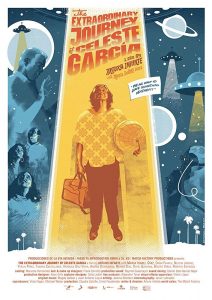

‘Captain Marvel’ celebrates coming into our own
“Captain Marvel” (2019). Cast: Brie Larson, Samuel L. Jackson, Ben Mendelsohn, Jude Law, Annette Bening, Lashana Lynch, Clark Gregg, Gemma Chan, Djimon Hounsou, Lee Pace, Akira Akbar, Azari Akbar, Kenneth Mitchell, Mckenna Grace, London Fuller, Reggie/Gonzo/Archie/Rizzo. Directors: Anna Boden and Ryan Fleck. Screenplay: Anna Boden, Ryan Fleck and Geneva Robertson-Dworet. Story: Nicole Perlman, Meg LeFauve, Anna Boden, Ryan Fleck and Geneva Robertson-Dworet. Web site. Trailer.
Many of us have likely had experiences where we walk around in a fog wondering who we really are. Whether it’s determining the nature of our calling or the scope of our talents or some other consideration, from time to time we’ve all gone through episodes like this where we feel we’re lost and unable to find our way. There may be clues to help point the way, but they may be vague, fragmented or seemingly unrelated to one another, offering little assistance and perhaps confusing matters even more. Our best hope in situations like this is that a clear path will reveal itself to set us on our way, enabling us to become who we were meant to be. Such is the case with a hero in training seeking to discover herself and live up to her full potential, the central thrust of the thrilling new action-adventure saga, “Captain Marvel.”
On the planet Hala, home world of a race of noble warriors known as the Kree, Starforce cadet Vers (Brie Larson) is troubled by her dreams. These nighttime visions feature people and events that are ostensibly unknown to her but that also possess a strangely vague familiarity. That’s particularly true when it comes to images of a charismatic middle-aged woman who makes recurrent appearances. But the lack of ready answers to this conundrum bothers Vers; as someone who’s quickly riled and easily motivated to get to the bottom of matters, she grows restless with the lack of definitive resolution.
[caption id="attachment_10574" align="aligncenter" width="300"] Superhero extraordinaire Captain Marvel (Brie Larson) sees her tremendous powers emerge thanks to a series of incredible events and profound introspection in the blockbuster new adventure, “Captain Marvel.” Photo by Film Frame © Marvel Studios, courtesy of Walt Disney Studios Motion Pictures USA.[/caption]
Superhero extraordinaire Captain Marvel (Brie Larson) sees her tremendous powers emerge thanks to a series of incredible events and profound introspection in the blockbuster new adventure, “Captain Marvel.” Photo by Film Frame © Marvel Studios, courtesy of Walt Disney Studios Motion Pictures USA.[/caption]
Unsure what to do, Vers turns to her mentor and commander, Yon-Rogg (Jude Law), for advice. He recommends that she work on controlling her emotions (before they control her), especially in light of the magnitude of her ample special powers, such as an ability to blast powerful proton ray bolts from her fists. So, to attain the self-control and peace of mind she seeks, he encourages her to take an audience with the Supreme Intelligence, a fusion of consciousness and A.I. that governs and advises the Kree, particularly in matters of discovering and understanding their true selves.
Vers agrees with her mentor’s suggestions and decides to seek the S.I.’s counsel. This protean, enigmatic energy-based entity communicates with its petitioners by assuming the form of the individual each of them subconsciously most admires. For Vers, the S.I. takes the shape of the woman from her dreams (Annette Bening), affirming for her that this stranger is apparently someone for whom she holds a deep-seeded respect. But for what purpose?
Vers comes away from the experience no more enlightened than when she went in, although the visit apparently triggers enhanced recall of her repressed memories, which obviously must be important to her, even if she can’t determine their significance or pinpoint the source of their origin. She attempts to set the issue aside as she prepares for her next military assignment, a rescue mission to retrieve a Kree spy captured by the Skrulls, a race of shape-shifters with whom her people are at war. However, while carrying out her duties, Vers is captured by the Skrulls’ commander, Talos (Ben Mendelsohn). But, as someone is not one easily detained, the resourceful cadet makes her getaway when an opportunity presents itself, fleeing in an escape pod that sends her barreling toward a mysterious planet designated C-53, otherwise known as Earth.
[caption id="attachment_10575" align="aligncenter" width="300"]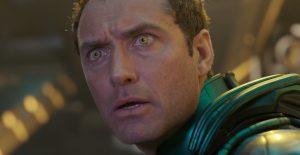 Starforce Leader Yon-Rogg (Jude Law) provides much-needed guidance to a wary cadet in the exciting new superhero release, “Captain Marvel.” Photo by Film Frame © Marvel Studios, courtesy of Walt Disney Studios Motion Pictures USA.[/caption]
Starforce Leader Yon-Rogg (Jude Law) provides much-needed guidance to a wary cadet in the exciting new superhero release, “Captain Marvel.” Photo by Film Frame © Marvel Studios, courtesy of Walt Disney Studios Motion Pictures USA.[/caption]
Separated from her peers in a place called Los Angeles in the year 1995, Vers desperately seeks to reunite with her fellow warriors. But, given their faraway location and the “primitive” communications technology of the planet on which she now finds herself, arranging a rendezvous takes some doing. And, considering that the cadet’s less-than-discreet arrival has drawn considerable attention from authorities, Vers scrambles to establish a low profile, not an easy task with both government officials and Skrull insurgents in hot pursuit.
In the midst of the chaos, Vers encounters Nick Fury (Samuel L. Jackson), an agent of a clandestine government organization known as S.H.I.E.L.D. (Strategic Homeland Intervention, Enforcement and Logistics Division). Given the extraordinary events unfolding around them, Fury is unexpectedly drawn into an investigation that’s far above his pay grade. Nevertheless, he’s so intrigued that he seeks to assist Vers in whatever way he can. Drawing upon his high-level clearances, Fury helps Vers gain access to secret government facilities where the mystery behind her dream images is slowly revealed.
“Vers,” as it turns out, is a variation on the name she went by when she lived the life of an earthly human, Carol Danvers, a test pilot who was killed in a crash six years earlier. What’s more, upon further investigation, Vers/Carol learns that the mysterious woman from her dreams was Dr. Wendy Lawson, a Kree aeronautics scientist also killed in a crash, who came to Earth in human form to secretly work on developing technology that she believed would end the war in which her people were bitterly embroiled. But, as significant as those discoveries are, they pale in comparison to the biggest one of all – the reason why Dr. Lawson was working on her technology in the first place, a revelation that makes clear much of what Vers has long believed about her world and her people is far from the truth.
[caption id="attachment_10576" align="aligncenter" width="300"]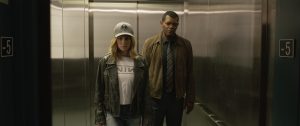 Starforce cadet Vers (Brie Larson, left) and S.H.I.E.L.D. agent Nick Fury (Samuel L. Jackson, right) embark on an incredible earthly adventure in the year 1995 in the spellbinding new superhero release, “Captain Marvel.” Photo by Film Frame © Marvel Studios, courtesy of Walt Disney Studios Motion Pictures USA.[/caption]
Starforce cadet Vers (Brie Larson, left) and S.H.I.E.L.D. agent Nick Fury (Samuel L. Jackson, right) embark on an incredible earthly adventure in the year 1995 in the spellbinding new superhero release, “Captain Marvel.” Photo by Film Frame © Marvel Studios, courtesy of Walt Disney Studios Motion Pictures USA.[/caption]
Armed with this information, Vers/Carol commits to seeing through Dr. Lawson’s goal. She joins forces with her onetime best friend, fellow test pilot Maria Rambeau (Lashana Lynch), along with Fury and several other unexpected allies (including Dr. Lawson’s specially gifted cat, Goose (Reggie/Gonzo/Archie/Rizzo)), to carry out this mission. It’s an undertaking that ushers forth an array of unexpected new developments for two worlds at war. But, on a personal level, it also brings about significant changes in the protagonist herself, empowering new attributes that are truly something to marvel at.
The incredible journey of this remarkable woman is truly something to see, not only in terms of the extraordinary nature of the circumstances, but also with regard to the personal transformation she undergoes. Her true self emerges from her inner depths, surfacing to take its rightful place in her world. It’s a process that calls upon Vers to take an introspective look at who she really is, an endeavor requiring her to grasp the beliefs that define her character. Understanding those notions is fundamentally important, for they shape the reality of who she is and what she experiences, cornerstone principles of the conscious creation process, the philosophy that maintains we tap into our thoughts, beliefs and intents to manifest the existence around us.
[caption id="attachment_10577" align="aligncenter" width="200"] Skrull commander Talos (Ben Mendelsohn) takes on his worthy enemies, the Kree, in the self-titled origin story of superhero “Captain Marvel.” Photo by Chuck Zlotnick © Marvel Studios, courtesy of Walt Disney Studios Motion Pictures USA.[/caption]
Skrull commander Talos (Ben Mendelsohn) takes on his worthy enemies, the Kree, in the self-titled origin story of superhero “Captain Marvel.” Photo by Chuck Zlotnick © Marvel Studios, courtesy of Walt Disney Studios Motion Pictures USA.[/caption]
During her time on Hala, Vers has only a vague sense of who she is. It bothers her, too, which is why she so earnestly seeks to create the conditions that will eliminate that uncertainty. This explains her experiences with the Supreme Intelligence, her repressed memory recall and her eventual journey to Earth, all of which set up the opportunity for the truth to emerge – and for her true nature to come out.
This process involves not only a revelatory understanding of her present circumstances; it also requires her getting in touch with a past of which she knows virtually nothing. It calls for her to get in touch with experiences deeply buried in another time, not only the events themselves, but also her beliefs about them. Accessing these feelings provides valuable insights into her younger self, first as a child (London Fuller) and then as an adolescent (Mckenna Grace). Vers/Carol sees who she was, an adventurous spitfire who was often discouraged from partaking in activities in which girls weren’t supposed to engage, an attitude routinely promoted by authority figures, such as her father (Kenneth Mitchell).
[caption id="attachment_10578" align="aligncenter" width="300"] Test pilot Carol Danvers (Brie Larson, right) and her best friend, Maria Rambeau (Lashana Lynch, left), seek to soar to new heights in the thrilling new action-adventure saga, “Captain Marvel.” Photo by Film Frame © Marvel Studios, courtesy of Walt Disney Studios Motion Pictures USA.[/caption]
Test pilot Carol Danvers (Brie Larson, right) and her best friend, Maria Rambeau (Lashana Lynch, left), seek to soar to new heights in the thrilling new action-adventure saga, “Captain Marvel.” Photo by Film Frame © Marvel Studios, courtesy of Walt Disney Studios Motion Pictures USA.[/caption]
As discouraging as these positions were, though, young Carol refused to let them hold her back. She believed in herself and her abilities and didn’t hesitate to act upon them in materializing the existence she experienced. It’s what enabled her to become a test pilot, for example. And, in a less than conscious way, it’s also what allowed her to become a Starforce cadet, even though she wasn’t fully aware of what she was getting herself into. But, as difficult as this path was, it’s also what brought forth the ultimate expression of her true self as a seeker of peace and a protector of the downtrodden, her emergence as a superhero, Captain Marvel.
Captain Marvel’s accomplishments go beyond her feats of heroics; they reveal her as a character who can do more than just beat up the bad guys. They also reveal her as someone who is a shining beacon of compassion, one who cares profoundly for the needs and well-being of others, particularly those who are unable to adequately fend for themselves. But, even more importantly, they show her as an example of someone who deeply inspires others, particularly those of her gender, such as Maria’s preteen daughter Monica (Akira Akbar), a youngster cut from the same cloth as her beloved Auntie Carol.
[caption id="attachment_10579" align="aligncenter" width="300"]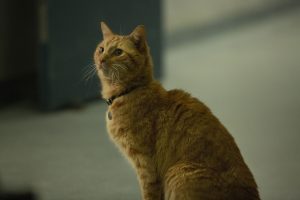 Plucky feline Goose (Reggie/Gonzo/Archie/Rizzo) proves to be quite a formidable ally and adversary in the superhero action-adventure, “Captain Marvel.” Photo by Chuck Zlotnick © Marvel Studios, courtesy of Walt Disney Studios Motion Pictures USA.[/caption]
Plucky feline Goose (Reggie/Gonzo/Archie/Rizzo) proves to be quite a formidable ally and adversary in the superhero action-adventure, “Captain Marvel.” Photo by Chuck Zlotnick © Marvel Studios, courtesy of Walt Disney Studios Motion Pictures USA.[/caption]
All of these attributes are reflective of the conscious creation principle known as value fulfillment, the concept that we live our lives as our best, truest selves for the betterment of ourselves and the world around us. Vers/Carol/Captain Marvel has much to offer us – and herself – by allowing her innate qualities to come to the surface. This aspect of the protagonist’s story is perhaps as important as anything she does to vanquish the evildoers, revealing what truly makes a superhero “super.”
Hands down, “Captain Marvel” is the best superhero movie I’ve seen in quite some time. It’s excellent in every regard – well written and well acted, without an overreliance on action or special effects gimmickry to carry the story. Oscar-winning actress Brie Larson, while best known for her dramatic turns in films like “Short Term 12” (2013) and “Room” (2015), seamlessly steps into the role of superhero, capably supported by a cast of colorful supporting players who add humor, intrigue and warmth to a well-constructed narrative. Frankly, I don’t care how well or how poorly this offering fits into the larger Marvel Comics Universe mythology or the overall marketing strategy of the franchise; I judge a film on its individual merits, and, on this score, this picture succeeds brilliantly on every front. This release does what a movie of this genre should – entertain, inspire and leave viewers feel as though they’ve genuinely gotten their money’s worth from the theatrical experience.
[caption id="attachment_10580" align="aligncenter" width="200"] Former test pilot Carol Danvers-turned Starforce cadet Vers emerges as a formidable superhero in the self-titled origin story of “Captain Marvel.” Photo by Chuck Zlotnick © Marvel Studios, courtesy of Walt Disney Studios Motion Pictures USA.[/caption]
Former test pilot Carol Danvers-turned Starforce cadet Vers emerges as a formidable superhero in the self-titled origin story of “Captain Marvel.” Photo by Chuck Zlotnick © Marvel Studios, courtesy of Walt Disney Studios Motion Pictures USA.[/caption]
Breaking through the barriers that keep us from seeing, understanding and appreciating the truth about ourselves can be a genuinely fulfilling experience. It allows us to assess and draw upon our own unique set of personal capabilities, skills and talents that have the potential to do a lot of good in the world – and beyond. The example offered here provides us with a tremendous source of inspiration to see this through – and to attain goals that are super in every sense of the word.
Copyright © 2019, by Brent Marchant. All rights reserved.
Monday, March 11, 2019
‘Birds of Passage’ cautions us to consider what we create
“Birds of Passage” (“Pájaros de verano”) (2018 production, 2019 release). Cast: José Acosta, Natalia Reyes, Carmiña Martínez, Jhon Narváez, Greider Meza, José Vicente Cotes, Juan Bautista Martínez, Sergio Coen, Aslenis Márquez, José Naider, Yanker Díaz, Joaquín Ramón, Luisa Alfaro, Natalia Pinzón, Sebastián Celis, Alice Lebadie, Dennis Klein, Gabriel Mangones, Rosario Epieyú. Directors: Cristina Gallego and Ciro Guerra. Screenplay: Maria Camila Arias and Jacques Toulemonde Vidal. Story: Cristina Gallego and Ciro Guerra. Web site. Trailer.
We all love it when we come up with what we think of as a great idea. We envision possibilities for success that meet, if not exceed, our expectations. But how often do we think through such notions thoroughly? Failing to do so can carry significant implications, some that may even threaten the existence we know and enjoy. Such is the case for a tribe of native people flirting with the ways of the modern world in the captivating new Colombian release, “Birds of Passage” (“Pájaros de verano”).
It’s amazing how quickly life can change. For the Wayúu people of Colombia’s northern Guajira Peninsula, their long-established way of life did just that in the late 1960s – and not for the better. That story is the stuff of which this fact-based film is made.
In 1968, when the young and lovely Zaida (Natalia Reyes) emerges from a year of confinement during which she transforms from an adolescent into a woman, the community celebrates her arrival into adulthood – and her availability to take a mate. Would-be suitors vie for her hand, but the potential beau most anxious to wed her is the handsome young Rapayet (a.k.a Rafa) (José Acosta). However, despite his desire and determination to woo Zaida, Rafa has something of a reputation weighing him down. If he’s to win her hand, he’ll have to prove himself especially worthy, and he’ll need all the help he can muster.
[caption id="attachment_10565" align="aligncenter" width="300"] Rafa (José Acosta, left) and Zaida (Natalia Reyes, right) engage in an ancient courting ritual of Colombia’s Wayúu people in the captivating new release, “Birds of Passage” (“Pájaros de verano”). Photo by Jenna Martin, courtesy of The Orchard.[/caption]
Rafa (José Acosta, left) and Zaida (Natalia Reyes, right) engage in an ancient courting ritual of Colombia’s Wayúu people in the captivating new release, “Birds of Passage” (“Pájaros de verano”). Photo by Jenna Martin, courtesy of The Orchard.[/caption]
Fortunately, Rafa has the strong support of his uncle, Peregrino (José Vicente Cotes), who eagerly talks up his nephew’s many accomplishments in making up for the past and in becoming a successful businessman, particularly in his dealings with the alijunas (outsiders not to be readily trusted). But, even with such backing, Rafa faces an uphill battle in convincing Zaida’s mother, Úrsula (Carmiña Martínez), the tribe’s formidable matriarch, to grant him what he seeks.
After lengthy discussions, Úrsula reluctantly agrees to give her daughter’s hand to Rafa if his family can come up with a sizable dowry, one that’s unusually large compared to most typical arrangements. Rafa agrees to the terms, despite Peregrino’s doubts about his nephew’s ability to fulfill the request. What’s more, even after Rafa pledges his word to his future mother-in-law, Úrsula reiterates her reservations; as one who possesses the gift of prophecy and is well-versed in her people’s ancient spiritual ways, she senses Rafa will bring trouble to her family, despite his reassurances that he’ll provide well for Zaida and her clan while honoring the tribe’s customs.
With the arrangements set, Rafa goes about raising the funds he’ll need to pay for the dowry. He deals in various crops, such as coffee beans, with his alijuna friend, Moisés (a.k.a. Moncho) (Jhon Narváez), but the money these transactions generate is far from sufficient to meet his obligations. Things change, however, when the duo meets Peace Corps volunteers (Sebastián Celis, Alice Lebadie) looking for what brought them to Colombia in the first place – marijuana. And, when Rafa and Moncho learn how much the Americans are willing to pay for it, they realize they have a lucrative new business opportunity staring them in the face, one that will cover the cost of the dowry and then some.
[caption id="attachment_10566" align="aligncenter" width="199"] Having emerged from a year of confinement in which she transformed from an adolescent into a woman, Zaida (Natalia Reyes) entertains the proposals of would-be suitors in “Birds of Passage” (“Pájaros de verano”). Photo by Nic Izzi, courtesy of The Orchard.[/caption]
Having emerged from a year of confinement in which she transformed from an adolescent into a woman, Zaida (Natalia Reyes) entertains the proposals of would-be suitors in “Birds of Passage” (“Pájaros de verano”). Photo by Nic Izzi, courtesy of The Orchard.[/caption]
To fulfill their pending order with the gringos, Rafa visits his cousin Aníbal (Juan Bautista Martínez) at his mountain plantation. Aníbal grows marijuana but not in large amounts. Rafa tells his cousin that his customers are willing to pay a hefty price for his crop, one that could turn a tidy profit for both of them and likely lead to an ongoing source of new business. He proposes buying Aníbal’s entire stock to get the ball rolling, a venture that promises to be worthwhile for all concerned. Rafa thus earns the cash to more than cover the dowry; party boy Moncho gets the funds to live larger than he ever dreamed; Aníbal raises the money needed to expand his production; and the gringos get the best pot they’ve ever smoked, and they like it so much that they look to expand their arrangement with the locals, one that’s built on a hefty export business.
Before long, Rafa and Zaida are happily married, the proud parents of two children, Miguel (José Naider) and Indira (Aslenis Márquez). The rest of the family benefits, too, especially Úrsula and Peregrino, who live better than they ever have. Zaida’s younger brother, Leonides (Greider Meza), gets in on the act as well, taking full advantage of the clan’s newfound wealth.
However, despite such tremendous success, as the new decade descends and the demand for pot surges, the once-small-time family dealers see their operation turn into a big business. Suddenly, Rafa and his cohorts must contend with new issues like a stepped-up need for security, competition from rivals and constant government scrutiny necessitating payoffs to officials like the vigilant Corporal Ramírez (Gabriel Mangones), who never misses taking his cut. Such measures require discipline and an orderliness that won’t allow for the intrusion of sloppiness, carelessness or a lack of discretion, behavior becoming increasingly typical of Moncho and Leonides. This change in circumstances calls for changes in practices and procedures in which everyday practicalities come into conflict with longstanding tribal customs and traditions, as well as individual behavior. Some of the adjustments don’t go over well, leading to disagreements, disruption and even death.
[caption id="attachment_10567" align="aligncenter" width="300"] Tribal matriarch Úrsula (Carmiña Martínez) makes decisions aimed at benefitting her people, as well as herself, in the engaging new Colombian release, “Birds of Passage” (“Pájaros de verano”). Photo by Jenna Martin, courtesy of The Orchard.[/caption]
Tribal matriarch Úrsula (Carmiña Martínez) makes decisions aimed at benefitting her people, as well as herself, in the engaging new Colombian release, “Birds of Passage” (“Pájaros de verano”). Photo by Jenna Martin, courtesy of The Orchard.[/caption]
Despite tremendous prosperity, Úrsula’s initial concerns, it would seem, start to surface. But, then, Úrsula, like so many other members of the family, has never turned away from availing herself of the wealth that dealing pot has brought them. The bottom line here is that the greed produced through this venture has torn the family apart, corrupting its members and leading to a civil war (or, more accurately, a wholly uncivil war) amongst all involved, a conflict that threatens to wipe out the clan’s culture, destabilize the entire region and disrupt the way of life of the Wayúu people collectively. The reverence and grace that once characterized this tribe of noble souls is on the verge of being lost – and for what? Ego pride? Rampant materialism? Money? This is the question everyone must now ask themselves before it’s too late – if it’s not already.
It's been said that necessity is the mother of invention, and Rafa finds that out for himself when he searches for the means to address the dowry requirements. He sincerely believes he must come up with a solution, a notion that drives his thoughts, intents and actions, the cornerstones of the conscious creation process, the philosophy that maintains we draw upon these resources to manifest the reality around us. But, in tapping into the wisdom of this adage, he – like all of us – would be wise to carefully consider what we invent to address our needs.
As practiced conscious creators are well aware, our employment of the process is accompanied by a number of important considerations, such as our responsibility for what we materialize and the consequences associated with what results. Where Rafa’s undertaking is concerned, these issues should be obvious. And, based on how events play out, it’s apparent he hasn’t give much thought to them. He is preoccupied with achieving his objective with little regard for the fallout, a practice more commonly known as un-conscious creation or creation by default.
Not all of the blame rests with Rafa, though. Everyone involved in this scenario plays a part in manifesting this co-creation. Úrsula, Peregrino, Aníbal, Moncho and Leonides, for instance, all have agendas they want fulfilled and will do whatever it takes to see them realized, again all from the standpoint of un-conscious creation. Úrsula’s behavior is particularly appalling in that she takes such a hypocritical, holier-than-thou stance when circumstances go awry without ever acknowledging how she’s personally benefitted from the success of the operation.
[caption id="attachment_10568" align="aligncenter" width="300"] A family of small-time drug dealers looks to the future as they watch their operation grow into a big business, a change prompting significant alterations in the lives (from left) of Peregrino (José Vicente Cotes), Leonides (Greider Meza), Úrsula (Carmiña Martínez), Rafa (José Acosta) and Zaida (Natalia Reyes) in “Birds of Passage” (“Pájaros de verano”). Photo by Nic Izzi, courtesy of The Orchard.[/caption]
A family of small-time drug dealers looks to the future as they watch their operation grow into a big business, a change prompting significant alterations in the lives (from left) of Peregrino (José Vicente Cotes), Leonides (Greider Meza), Úrsula (Carmiña Martínez), Rafa (José Acosta) and Zaida (Natalia Reyes) in “Birds of Passage” (“Pájaros de verano”). Photo by Nic Izzi, courtesy of The Orchard.[/caption]
Such belief conflicts often yield confused results. That’s because the underlying beliefs directing them are fundamentally at odds with one another. That kind of contradiction often leads to skewed outcomes, mainly because our divine collaborator is unable to sort out the conflicted requests being made of it. Is it realistic, for example, to expect that the materialization of unchecked criminal activity will somehow produce harmonious, risk-free outcomes?
On a larger scale, there are belief conflicts here involving the preservation of traditions and the establishment of new ventures. The old world and the modern one clash with one another, one that almost assures chaos and disruption. And hoping that the two can somehow be maintained without discord is impractical and unrealistic, as the Wayúu come to find out for themselves.
Maintaining our presence of mind is crucial in such situations, especially when it comes to preserving an established and agreeable way of life. We need to remind ourselves of such matters and keep them at the forefront of our beliefs, which is why we need elements in our realities that serve that purpose. Such is the role played by a singing shepherd (Sergio Coen), one who recants the stories of the old ways and the old beliefs as told through native songs, works that serve as the overarching templates for each of the film’s various chapters. The key question, of course, though, is anyone listening? That’s a word to the wise for all of us, not just the native Colombians in this story.
Though occasionally predictable and somewhat meandering in the middle, this excellent offering on the rise of the drug trade and its impact on the country’s native people is otherwise well-executed on all fronts. With fine performances, beautiful cinematography and a nuanced though sometimes-rote script, “Birds of Passage” succeeds in telling a familiar story in an unfamiliar setting. This title, from the creators of the Oscar-nominated feature “Embrace of the Serpent” (2015), is time very well spent. The film, which has primarily been playing the festival circuit, is currently in limited release at theaters specializing in foreign, independent and arthouse pictures.
The search for paradise is something we crave, but sometimes we’re unaware we’ve already attained it. It’s only when it starts to slip away that we begin to appreciate what we’ve lost. That’s a tragedy, to be sure. But, if we take the time to consider what we’re creating – and how our tampering might be causing the grave disappearance of what we’ve so carefully sought to cultivate – we may be able to forestall such a tragic loss. Doing so may enable the birds of passage to pass on by rather than bring about a passing we’d rather not experience.
Copyright © 2019, by Brent Marchant. All rights reserved.
Tuesday, March 5, 2019
‘Blame’ searches for the nature of underlying truths
‟Blame“ (2017 production, 2018 release). Cast: Quinn Shephard, Nadia Alexander, Chris Messina, Tate Donovan, Tessa Albertson, Marcia DeBonis, Luke Slattery, Owen Campbell, Geneva Carr, Sarah Mezzanotte, Larry Mitchell, Lily Houghton, Elizabeth Ann Howell, Carlyle Owens, Trieste Kelly Dunn. Director: Quinn Shephard. Screenplay: Quinn Shephard. Story: Laurie Shephard and Quinn Shephard. Web site. Trailer.
Getting to the root of unethical or illegal behavior sometimes takes some doing. It may require considerable digging and ruling out what is initially looked upon as seemingly obvious. It might even involve traversing some highly unexpected paths to expose the culprits and their well-concealed misdeeds. There’s even the possibility that there may be more going on than meets the eye. So it is with life at an emotionally charged high school as seen in the seductive drama, “Blame,” now available on DVD and video on demand.
Sensitive but troubled teen Abigail Grey (Quinn Shephard) is about to return to high school after undergoing treatment in a mental health facility for an undisclosed disorder. All indications are that she’s doing better, and her parents (Elizabeth Ann Howell, Carlyle Owens) believe she’s ready to resume her regular routine. Abigail’s not so sure, but she goes along with the plan, despite her apprehensions.
Abigail’s biggest worry is how she’ll be treated by her peers, and, on this front, she has legitimate reasons for concern. Bullying and humiliation, it seems, are common practices at her school, especially the kind routinely doled by manipulative mean girl Melissa Bowman (Nadia Alexander) and her various cronies, Sophie (Sarah Mezzanotte), Ellie (Tessa Albertson), Eric (Luke Slattery) and TJ (Owen Campbell). Melissa even has a pet nickname for Abigail, callously referring to her as “Psycho Sybil,” an offensive, exceedingly hurtful reference to the title character of Flora Rheta Schreiber’s 1973 book about the treatment of a young woman afflicted with dissociative identity disorder (formerly known as multiple personality disorder).
[caption id="attachment_10559" align="aligncenter" width="300"] Life is complicated for troubled teen Abigail Grey (Quinn Shephard, right) when bullied by mean girl Melissa Bowman (Nadia Alexander, center) and her cronies (from left), TJ (Owen Campbell), Eric (Luke Slattery), Sophie (Sarah Mezzanotte) and Ellie (Tessa Albertson) in the seductive drama, “Blame,” now available on DVD and video on demand. Photo courtesy of Samuel Goldwyn Films.[/caption]
Life is complicated for troubled teen Abigail Grey (Quinn Shephard, right) when bullied by mean girl Melissa Bowman (Nadia Alexander, center) and her cronies (from left), TJ (Owen Campbell), Eric (Luke Slattery), Sophie (Sarah Mezzanotte) and Ellie (Tessa Albertson) in the seductive drama, “Blame,” now available on DVD and video on demand. Photo courtesy of Samuel Goldwyn Films.[/caption]
Needless to say, such cruel treatment makes Abigail’s return to school difficult. Fortunately, she’s able to find some solace in her drama class, a subject she seems to enjoy and one in which she receives ample encouragement from her teacher, Mrs. Howell (Geneva Carr), who also helps to shield her against malicious onslaughts from the resident bullies. However, when Mrs. Howell goes on maternity leave, Abigail’s future in the class is thrown into jeopardy. Thankfully, though, her fears are soon vanquished with the arrival of a kindly substitute, Jeremy Woods (Chris Messina), who takes a special interest in Abigail when he sees how unfairly she’s being treated by her classmates. But, even more than that, he’s also sufficiently impressed at how much talent she possesses.
Jeremy thus becomes both a protector and patron for Abigail. He intervenes on her behalf when she comes under attack from Melissa and her cohorts. And, to encourage the development of her acting ability, he assigns her the plum role of Abigail Williams in the class production of Arthur Miller’s The Crucible, a part that Melissa also wanted. Needless to say, being relegated to Abigail’s understudy brings out the worst in Melissa, prompting her to ramp up her menacing machinations and making her rival’s life ever more difficult. But, whenever the need arises, Jeremy steps in to shelter his prize pupil to see that she’s getting a fair shake on all fronts.
Because of all this attention, Abigail quickly begins taking quite a liking to Mr. Woods – and he to her. The relationship between teacher and student begins to grow more complicated and precarious. Each thinks about the other constantly, causing new problems, such as troubles in Jeremy’s relationship with his girlfriend, Jennifer (Trieste Kelly Dunn). And, when Abigail’s classmates begin getting wind of what’s going on, innuendo starts making the rounds, providing Melissa with new ammunition to smear the reputation of her classmate and, potentially, that of her teacher if she doesn’t get what she wants. Suddenly Jeremy’s choice of The Crucible for a class production takes on a whole new irony of its own.
[caption id="attachment_10560" align="aligncenter" width="300"] A special – and potentially inappropriate – relationship forms between troubled teen Abigail Grey (Quinn Shephard, left) and substitute teacher Jeremy Woods (Chris Messina, right) in writer-actor-director Quinn Shephard’s premiere feature, “Blame.” Photo courtesy of Samuel Goldwyn Films.[/caption]
A special – and potentially inappropriate – relationship forms between troubled teen Abigail Grey (Quinn Shephard, left) and substitute teacher Jeremy Woods (Chris Messina, right) in writer-actor-director Quinn Shephard’s premiere feature, “Blame.” Photo courtesy of Samuel Goldwyn Films.[/caption]
As questions of propriety swirl, Jeremy begins pulling back. But this leaves Abigail confused about his feelings toward her, a development that threatens to undo all the progress she’s made at becoming psychologically stable once again. In his attempt to offer help, he may have inadvertently made matters worse, and, with rumors of a possible inappropriate relationship rearing their ugly head, there could be even more at stake, especially when Melissa fans the flames of speculation.
But, as strange as all of the foregoing twists and turns have been, even more lie ahead – and they have the potential to affect those least expecting them. How everything plays out for all concerned raises serious questions about who’s really at fault and for what. The answers to the thorny questions raised here indeed carry the seeds of surprise, but sometimes it takes circumstances as complicated as these for the truth to be liberated – and to see where the blame for things really lies.
Situations like this frequently raise the question, “Why must we always make things so needlessly complicated?” In a civil world, much of the behavior on display here would be seen as patently unacceptable and inherently unnecessary. Yet here it is nevertheless. One can’t help but want to investigate how and why it arises in the first place.
The “how” of this is actually quite simple – like anything that crops up in our experience, it appears as a result of the conscious creation process, the philosophy that maintains we manifest the reality we experience through the power of our thoughts, beliefs and intents. But the “why” behind this is a trickier proposition. Considering the incendiary complications associated with these circumstances, not to mention the potentially explosive consequences that accompany them, one might wonder why any of the characters would want to create them, especially since they carry the seeds of needing to lay blame, as the film’s title suggests, at the foot of the responsible parties.
Convoluted situations like this often lead to the unraveling of complex scenarios that have long gone unaddressed and/or that frequently involve significant life lessons, revealing the kinds of profound insights that often surface through personal introspection or even psychotherapy. It also may involve the exposure of hidden truths that are masked by outward and seemingly inexplicable behavior. Why, for example, does Melissa feel so compelled to be such a bitch, especially toward someone as inoffensively harmless (and easily hurt) as Abigail? Melissa’s cruelty is so extreme and her manipulations are so conniving that even her friend Ellie eventually gets turned off by them.
[caption id="attachment_10561" align="aligncenter" width="300"] Bad girl Melissa Bowman (Nadia Alexander) hatches one of her many schemes to get her way in “Blame,” now available on DVD and video on demand. Photo courtesy of Samuel Goldwyn Films.[/caption]
Bad girl Melissa Bowman (Nadia Alexander) hatches one of her many schemes to get her way in “Blame,” now available on DVD and video on demand. Photo courtesy of Samuel Goldwyn Films.[/caption]
So what’s going on here? Is this a case of inherent evil emerging? Or is it something else, such as an unconscious projection of personal insecurities onto someone less able to fight back and defend herself? A look at Melissa’s dysfunctional home life, especially the heavy-handed, often-insensitive treatment doled by her stepfather (Tate Donovan), proves revelatory, but why take out those frustrations on Abigail? Maybe Melissa has feelings she’s not yet ready to deal with but can’t bear to keep them bottled up and thus needs to have some kind of outlet, such as an easily victimized target, like Abigail, on which to dump them.
And, speaking of Abigail, what role is she playing in this? Given that her relationship with Melissa is a co-creation, Abigail obviously plays a hand in its manifestation, but to what end? Could it be that her disempowered nature is serving as a mirror for her nemesis? What’s more, given Abigail’s unexpected success in drama class, is she setting an example to show others how they can overcome the same kinds of difficulties she’s been experiencing and excel? Her efforts in these areas may not be readily apparent, and she may have chosen a hard path to bring them into being, but if they’re understood and appreciated at some point, their impact could be substantial both in inspiring others and in helping her to heal herself.
Then there’s Jeremy. Why is he allowing himself to be drawn into a potentially career-ending and criminal involvement, especially since his actions may end up doing more harm than good? He knows it’s wrong, yet he can’t help but be tempted by the opportunity when it presents itself.
But is his relationship with Abigail truly about romance? While it might be to a certain degree, there’s potentially something else going on here, namely, a desire for Jeremy to be honest with himself, particularly when it comes to attaining what he wants. The onetime aspiring actor drifts from job to job, accepting temporary positions – such as his gig as a substitute drama class teacher – to hold him over, but never taking the initiative to be honest with himself about his heart’s desire or the steps needed to see it realized. Maybe the desire he feels for Abigail is intended to awaken this trait in him and to prompt him to adapt it to areas of his life where it clearly could stand to be implemented. Of course, he needs to get clear about what Abigail’s presence in his life truly means and not to misinterpret the passion she inspires in him as something other than what it really is.
A similar case can be made for why Jeremy is present in Abigail’s life. He encourages her, filling her with confidence and prompting her to develop and employ her sense of personal power. She needs this, both to develop her acting abilities, as well as to protect herself against the onslaught of personal attacks coming her way.
Clearly there’s a lot bubbling beneath the surface here, and many of the camouflaged elements covering them at the surface are keeping these issues from being recognized, let alone addressed. That’s how these situations end up becoming needlessly complicated. However, sometimes these masked elements need to be in place so that the potency of the revelations they eventually help to uncover are heightened and impactful, leaving a significant impression on those who need to get the messages they impart. Of course, the underlying meanings of these situations need to be discerned if they’re to have any value, because, if they’re not, misunderstandings surely arise, and that can lead to the consequence of blame needing to be assigned, something that ultimately benefits no one. High school, it would seem, could be a place of learning important lessons other than what’s taught in the classroom.
Though at times a little predictable and at other times a little underdeveloped, this premiere feature from 24-year-old writer-actor-director Quinn Shephard nevertheless shows her tremendous promise as a filmmaker. In this coming of age tale that combines elements of pictures as diverse as “Lolita” (1962), “Heathers” (1988) and “Carrie” (1976) (without the psychic aspects), Shephard explores topics ranging from mental health to emerging sexuality to inappropriate relationships to bullying in a thought-provoking yet entertaining vehicle. Shephard also turns in a fine performance as a misunderstood teen, backed by an equally strong portrayal by Nadia Alexander as her bad girl rival. Having been nominated for an Independent Spirit Award for best first screenplay, this film is available for screening through various home viewing options.
Sometimes we’re all too quick to point the finger at others for their behavior. But, as the old saying goes, when one finger is pointed at someone, there are three others pointed back squarely at us. What’s more, when circumstances are fundamentally misinterpreted because the truth is obscured, assessing them can be more problematic than one might assume. Assigning blame for such situations thus proves to be a trickier proposition than what might be apparent at first glance. Consequently, we must be careful where we direct those digits of ours; it could prove to be a more painful and humiliating experience than we anticipate.
Copyright © 2019, by Brent Marchant. All rights reserved.
